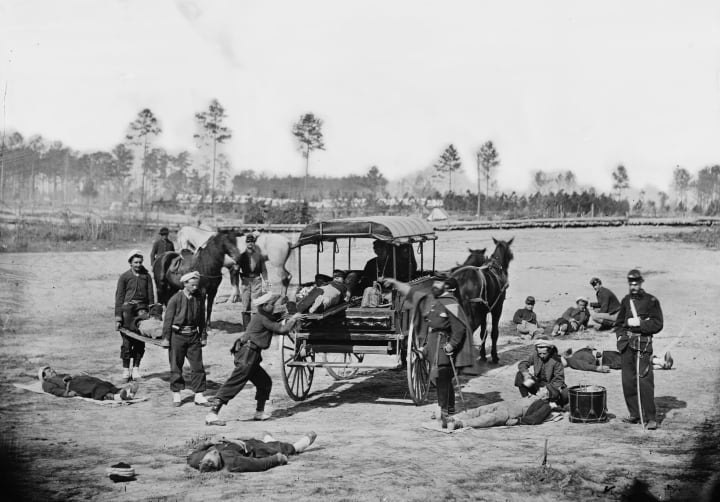10 Ways Military History Impacts Civilian Life
If you thought military history didn't have any impact on your day-to-day life, think again.

I remember my professor lecturing us about the Trojan Wars in history class. More specifically, I was sitting down, listening to the story of the Trojan horse, and the warning about "Greeks bearing gifts."
Like many others in class, I was enamored with the cool stuff I learned about military history in school. In fact, I often read military history books at home. It's fascinating stuff, and so often, it feels like the stories you hear come from an entirely different world. But, on this day, something irked me. I had a question I needed to know the answer to.
"Hey, teach? Why are we learning about this stuff? Why do we have to learn about dead guys, anyway?" I asked.
My professor, who had, up until this moment, put up with all of the shit-stupid questions I'd asked, remarked, "Why don't you search up sliced bread and come back to me?"
I asked him if he was serious. He was. So I researched sliced bread.
After finding out that sliced bread was actually a military invention, I realized that war, military groups, and military politics impacted daily life way more than we realize. Here are some of the better examples that might shock you.
Military history played a huge role in our modern diets.

American military history is literally chock-full of things we developed solely for the purpose of keeping our troops fed. A lot of the most common staples out there, including Hershey's Bars, were invented during World War II and the Cold War.
I'm willing to bet that, if you opened up your pantry, you'll find at least one or two everyday foods that were first developed just for the military. Go ahead, look in your pantry.
Pre-sliced bread? Military invention. Instant coffee? Military invention. The powdered cheese on your Cheetos? Also a military invention. Chocolate bars? Yes, those too, were developed by the military.
If you enjoy canned goods, you can thank Napoleon Bonaparte's army for that.
One of the coolest facts about military history that my professor taught me was the fact that Napoleon Bonaparte commissioned the invention of canning. He did it to help his troops win wars without starving to death—and ever since then, it's been used as a staple for humanity's survival.
Once again, preserving goods has proven to be a smart military strategy throughout the centuries. Vive la France!
You might also be using lingo that started in the military.
Have you ever said "SNAFU" or "FUBAR?"
I know I have, and it's actually fairly commonplace in my family. It ends up that both these acronyms are military terms that were used during World War II and the Vietnam War. Admittedly, my family has a lot of military members in it—so maybe "FUBAR" isn't the best example of a military term you might use.
How about saying that you have to "face the music?" This term originated as a way to discuss the dishonorable discharge of a military member. They would literally have to leave his unit to the cadence of his old drummer, a process that was called being "drummed out."
Another common military phrase you might have heard is "hearing it through the grapevine." The origins of this term can be found in Civil War military history. At the time, commands and news was transmitted through telegraphs.
Telegraph lines were nicknamed "grapevines" during the Civil War. So, hearing something "through the grapevine" was a common way to say that they received news from a telegraph.
If you believe in Murphy's Law, thank military history for giving you that concept.
"Whatever can go wrong, will go wrong." —Murphy's Law
Did you ever wonder where this concept came from, or who the hell Murphy was? Believe it or not, he was a real person. Capt. Edward A. Murphy was the guy who came up with the concept while he was working on Edwards Air Force Base.
Legend has it that an assistant asked how to better a project's turnout. Murphy replied, "If there’s more than one way to do a job and one of those ways will result in disaster, then somebody will do it that way."
Since then, the pessimistic view of planning has taken root on military bases and slowly seeped out into pop culture. This makes Edward A. Murphy one of the most famous military pessimists of all time.
The Civil War gave us ambulances and hospitals.

Scary as it is to think, there once was a time when most people would get their healthcare at home. A local doctor would go out to visit the person in their house, administer medicine, and go home.
Believe it or not, the Civil War changed all that.
During the American Civil War, generals realized they needed to have a way to save soldiers on the battlefield. They created the first ambulance corps in US history as a result. They would then take the wounded soldiers to a dressing station, then to a hospital for treatment.
After the war, the concept stuck around and people began to adapt to the war front concept. Hospitals started to have specific wards, including maternity wards. Female nurses from the war also flocked to hospitals for jobs.
The American Red Cross has its roots in military history, too.
The American Red Cross is one of the largest medical non-profits in the world. It has helped fund medical research, keep ailing hospitals afloat, and also helped people get the treatments that they otherwise wouldn't be able to afford.
Believe it or not, this organization also has its roots in the Civil War. Clara Barton, one of the most famous Civil War nurses, was the one who founded the Red Cross.
Then there's also the military fashion show you can see on store racks.
Do you enjoy trench coats? Pea coats? What about Ray-Bans or camo print? A lot of the common staples in your closet probably have some military history to them.
Much like with food, military factions around the world have created clothing and accessories to help their servicemen and servicewomen do better on the battlefield.
Both high fashion and street fashion have taken cues from military designs, so if you love your wardrobe, tip your hat to the military designers of yore.
Then there is the use of fireworks.
A lot of the little things that we think of as mainstream traditions first had their roots in the military. The most obvious example, the tradition of lighting fireworks during celebrations, has a lot of military roots to it.
Fireworks were first invented by the Chinese military while they were trying to create weapons. They ended up becoming used as celebratory devices that mimicked war.
Certain dog breeds also have serious ties to military history.

Ever since the very first war started, dogs have played a role in military history. It's also fairly common knowledge that certain dog breeds were specifically made in order to better serve alongside soldiers.
If you have a German Shepherd, a Doberman Pinscher, or a Boxer, chances are you've noticed that they are strong, sturdy dogs that are very useful as both companions and guards. You can thank military groups for that.
Finally, there's also the fact that war trivia never goes out of style.
The truth is that just about everything is touched on by some invention that the military has made. That doesn't mean that you can't also take note of some of the more obvious ways military knowledge can help you out.
If you've ever played Trivial Pursuit, then you better know your military history. Because, let's just face it, that trivia really does help you win plenty of games.
About the Creator
Cato Conroy
Cato Conroy is a Manhattan-based writer who yearns for a better world. He loves to write about politics, news reports, and interesting innovations that will impact the way we live.
Enjoyed the story? Support the Creator.
Subscribe for free to receive all their stories in your feed. You could also pledge your support or give them a one-off tip, letting them know you appreciate their work.






Comments
There are no comments for this story
Be the first to respond and start the conversation.